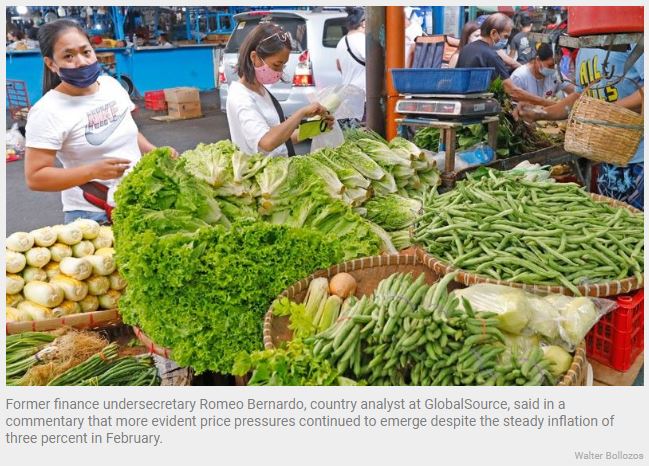Philippines: Think tank sees inflation breaching 2 to 4% target
MANILA, Philippines — New York-based think tank Global Source Partners Inc. expects inflation to accelerate and breach the two to four percent target set by the Bangko Sentral ng Pilipinas (BSP) due to soaring global oil and food prices, as well as the weakening peso.
Former finance undersecretary Romeo Bernardo, country analyst at GlobalSource, said in a commentary that more evident price pressures continued to emerge despite the steady inflation of three percent in February.
“Notwithstanding the moderate February inflation print, inflation risks are high in light of surging global commodity prices and the many uncertainties associated with Russia’s invasion of Ukraine, including the impact of western sanctions on Russia,” Bernardo said.
He said that both countries are major players in global trade of oil and gas, as well as wheat and other commodities.
Data from the Philippine Statistics Authority (PSA) showed that inflation was steady at three percent in February despite the 13.5 percent year-on-year increase in electricity prices and six percent rise in local fuel prices.
Bernardo said the costs of imported oil and oil products are directly passed on to consumers.
Price adjustments are done weekly based on the past week’s average cost and have continued through the start of March.
Likewise, 60 percent of the country’s power needs are generated by power plants, which rely mostly on imported fuel, particularly coal. These power plants are allowed to pass on the costs to consumers.
Bernardo said the price of natural gas from the local Malampaya plant, which fuels 20 percent of total generation, is anchored on coal.
On the other hand, he added cereals prices rose by 3.3 percent in February.
Although rice takes up the bigger share of close to nine percent of the consumption basket, he said the combined corn and wheat-based products account for less than 3.5 percent share.
However, wheat and corn are key ingredients for animal feeds and rising prices would ripple through the food production chain.
“Corn prices have risen by double digits in recent months. The Philippines relies entirely on wheat imports and needs to supplement rice production with imports,” Bernardo said.
Furthermore, the former finance undersecretary said the continued weakening of the peso against the dollar due both to tightening global financial conditions and a higher import bill would worsen the impact of rising oil and cereal prices on local inflation.
He also warned about the creeping second round impacts on other goods and services both at the global and local levels, including transport costs, production inputs such as fertilizer costs, food manufacturing, wages, among others.
“For now, with the local economy just reopening after the Omicron surge and still high unemployment, we expect calls for wage hikes to be muted,” Bernardo said.
He said the government is also providing direct subsidies to drivers of public utility vehicles, farmers and fisherfolks to help them cope with the rising fuel costs.
“That said, rising inflation will be a drag to the economic recovery and will make monetary policy management more challenging. We still expect monetary authorities to retain their growth bias and delay any tightening move until the second semester,” Bernardo said.
BSP Governor Benjamin Diokno said monetary authorities are likely to maintain an accommodative monetary policy stance in the first half of the year.
Source: https://www.philstar.com/business/2022/03/14/2167026/think-tank-sees-inflation-breaching-2-4-target


 English
English




